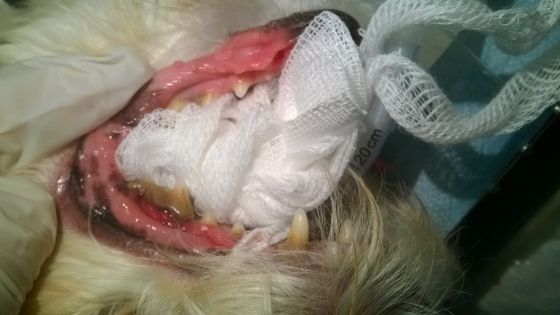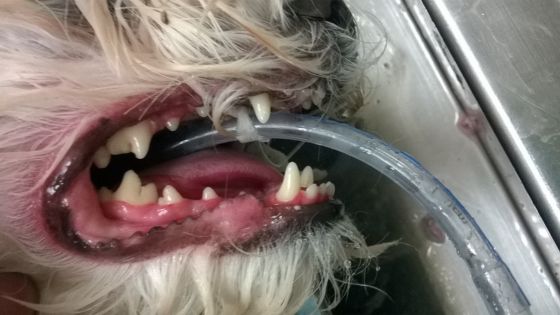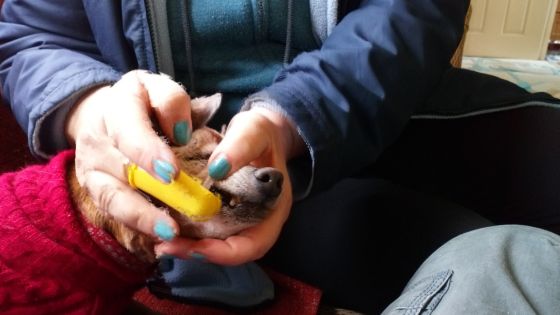Have you always figured bad breath in dogs was a given? Something you had to put up with?
Well, it turns out it isn’t, and you don’t!
Why Dogs Have Bad Breath
Bad breath is usually caused by gum or dental disease, and means better care of your dog’s teeth is required.
However, it could also signal other problems like metabolic disorder, respiratory problems, gut or internal organ issues, or your dog is simply eating poop.
In older dogs, liver and kidney disease often affect the mouth. Conversely, dental disease can affect the liver and kidneys. The bacteria that grows when tartar builds up around the teeth can break loose and enter the blood stream, lodging in crevices in the kidneys, liver and on valves of the heart.
Whatever the cause, you need to make an appointment to see your vet sooner rather than later.
Do We Take Dog Dental Care Seriously Enough?
In my experience we don’t.
There is a whole month (February) dedicated to spreading the word about the importance of pet dental health, yet I wonder if the message is getting through. I guess it’s time for me to do my part then!

Why is Caring for Our Dog’s Teeth So Important?
I guess I want to re-word that question and ask “how can it not be important?” A lack of oral hygiene over the years will catch up with our dogs and can cause serious organ damage (heart, kidney, liver) as infection enters the bloodstream, significantly shortening their life.
Not every case will be that extreme, but that doesn’t mean your dog is not experiencing pain from a toothache or infection right now! Dogs are good at hiding pain so just because you aren’t noticing an obvious change in behavior, doesn’t mean there isn’t a problem festering and getting worse.
Think back to how much pain you’ve been in from a cavity or abscess. You were able to reach for pain relief and visit the dentist, your dog has to wait for you to figure it out.
There is good news though, because it’s never too late to start caring for your dog’s teeth, and right now is the best time to start.
Can We Prevent Bad Breath in Our Dogs?
Just like we keep our teeth and gums healthy with regular brushing and cleaning, the same can be done for our dogs.
Brush your dog’s teeth every day, if possible. If not, even a couple of times a week will help. Toothbrushes come in a variety of sizes, and some even fit on your finger. Don’t forget the doggy toothpaste! A liquid, antiplaque solution is available to pour into your dog’s drinking water.
Chew toys, and dental chews will also help.
Having said all this, if you do notice bad breath this will only mask the underlying cause not fix it. For that you’ll need to see your vet.
Signs Your Dog Has Dental Issues
Usually, the only symptom or should I say the most obvious symptom to most people is bad breath.
Here are other signs….
- Loss of interest in eating or struggling to eat
- Not chewing on a favourite toy
- Pawing at the mouth
- Won’t let you near his mouth
- Swallows without chewing
- Favors one side when eating
- Less interested in playing
- Drooling
- Withdrawn/not him or her self/changes in behavior
Your Dog Has One or More of the Signs Listed Above…Now What?
Make sure your dog is seen by the vet as soon as possible. In the meantime, make notes of when you started noticing the bad breath, any behavior changes, your current dog dental care routine and anything else you can think of that may be relevant.
What to Expect at Your Vet Appointment
Your vet will first have a chat with you about your concerns, and that’s when your notes will come in handy. He’ll most likely do a thorough check of your dog, including listening to his heart. Next, he’ll check his mouth and determine to the best of his ability, what he believes is going on.
Keep in mind some dogs are extremely uncooperative, like my dog Red for example, so he may not get as good a look as he would like. Even if your dog will let him do whatever he wants, the true extent of the problems can never be evaluated until your dog is under anesthesia and x rays are taken.
From that check your vet will recommend a treatment plan, which can include pain medication, antibiotics or surgery.
If your dog’s teeth and gums look good, further testing which will likely involve blood and urine tests will be carried out, to determine the source of the bad breath.
Treatment
Depending on what your vet finds and the health of your dog, antibiotics (long term or short) may be recommended. Surgery is also a possibility.
If bad breath is the result of your dog’s diet, a change may be recommended.
If tests revealed another reason, your vet will come up with an appropriate treatment plan.
Surgery
If surgery is recommended, make sure you discuss risk and expense. You have a right to question the process, so please don’t let your vet dismiss your concerns. You need to trust him and feel like you’re being taken seriously and if not, you may want to find another vet.
risk
Many senior dog parents in my FB group are faced with the prospect of surgery for their dog (for dental issues or other reasons). One of their biggest fears is allowing their dog to be put under anesthesia, with some refusing it altogether because of it. I urge you to have a conversation with your vet, explain your concerns and then make a decision.
“Is Anesthesia Safe for Senior Dogs”
expense
Have an honest conversation about the cost, because in my experience it’s always more than you expect. The last thing you want is to be shocked when you pick up your dog.
Every extraction and x ray will add to the cost, so ask if your vet can provide a detailed estimate in advance. My vet is always happy to do that, and we then go over each item and see if it’s possible to remove any. For example, they always like to have a blood test done before anesthesia, but if it was already done recently it’s something we don’t need to repeat.
Ultimately the decision to go ahead with surgery is yours, but if it’s recommended and you put it off, the problems can only get worse, your dog will get older adding to the risk, surgery will be longer, more invasive and the cost higher.

Can You Avoid Another Dental Surgery?
There’s no guarantee, but the recommendations listed below will make a difference.
Yearly or twice-yearly checks
Make sure during your yearly or twice yearly senior dog checkups, the vet takes a good look at your dog’s mouth.
Regular brushing
The more often you brush your dog’s teeth the better, so if you can do it daily, fantastic. If not, do it as many times a week as you can. A quick brush is better than nothing.
There are several styles of toothbrush, so it might be a case of trial and error to find one he tolerates. Here are some of the options…
- Long handled with a brush on one end
- Long handled with a large brush on one end, small one on the other
- A finger brush that, you got it, fits over your finger and has bristles at the top
- 3 sided brush
- Electric toothbrush
- A simple piece of gauze wrapped around your finger
Only use a toothpaste specifically designed for dogs. There are a variety of flavors to entice, or make your own using one of the many homemade recipes you can find online.
Your dog won’t let you near his mouth
You’ve tried the different toothbrushes, bought every flavour toothpaste, and your dog won’t let you near his mouth. What about tooth gel that just needs to be rubbed on his teeth? There’s also a powder to sprinkle on food.
Will these, or the other options I’m going to talk about in a minute take the place of regular brushing? Not according to my vet, but they are all still worth implementing into your dog’s new dental routine, because everything you do will make a difference.
Dental chews
The act of “gnawing” helps scrape the teeth, remove plaque and stimulate the gums. If you are unable to brush your dog’s teeth, then I highly recommend dental chews. Even if you do brush they will still help, and relieve boredom.
When deciding which chews to buy, walk away from any with an ingredient list as long as the packaging that is impossible to identify. If your dog has diet restrictions, check the ingredients with your vet first.
**Never leave your dog unattended when he has a bone or a chew.
Chew toys
Chew toys, textured chew bones, rubber bones and rope toys are great additions to your dog’s oral hygiene routine. The benefit of a toy over an actual food product is the lack of calories, and no ingredients that might be forbidden in your dog’s diet. Keep things interesting by switching between toys and chews.
Water additive
A mouthwash added to your dog’s water bowl is another worthwhile product, but not to be relied on to be effective on its’ own. They may alter the taste of the water, but my dogs never had a problem. If you notice your dog drinking less or not at all, stop using it right away. Keeping your dog well hydrated is crucial.
Raw food diet
Gnawing on raw meat acts as a teeth cleaner, a natural toothbrush, and can help remove tartar. It seems there is a lower incidence of dental disease in animals on a raw food diet, although that does not mean dental disease never happens.
Please don’t run out and buy raw meat or bones without consulting a holistic vet, or your regular vet to determine if it’s right for your dog.
What I Do for My Senior Dog Red

Red weighs 10lbs, but if you go anywhere near her mouth, she’ll clamp that jaw shut and nothing is getting in. I assume a lot of that has to do with the fact she’s blind and doesn’t know what’s happening, although you’d think after all these years she’d get used to it…but no.
I have a long-handled toothbrush and I start off with great intentions but she’s so stressed and gets herself so worked up, over time it becomes too much and I stop.
Wrapping gauze around my finger is tolerated a bit more, and I was using a tooth gel directly on her teeth, so no brush is needed. Unfortunately, they were never going to fix the problems she already had and those needed to be addressed.
She’s 15ish and had dental surgery 2 days ago. Not an ideal scenario at her age, but I went ahead with it because:
I trust my vet with her life and I knew if something were to happen during the surgery, it would not have been his fault.
I was worried she may be feeling pain and that is not something I can accept.
If I waited and in a few months’ time we checked again, all that would mean is she would be a few months older and more at risk.
I made the right decision because things were worse than he expected. Once she was sedated and he was able to have a good look, he could see things were bad and needed x rays to see the true picture. Long story short she had 6 teeth removed.
The first night was a bit tough as I knew it would be. She’s blind so being groggy is scary for her. She’s on pain medication and I gave her Arnica to help her body recover from the surgery and she’s doing well.
I was feeling quite responsible because nothing is more important than her care, but the vet felt in her case age did play a large part in what was going on.
In a few days when her mouth has healed, I will start with the gauze and some gel. Even a few seconds is better than nothing, because I never want her going through that experience again.
Note: This section about Red was taken from an article I wrote a few years ago. Sadly she is no longer with us, but I left it written in the present tense.
Was your dog’s bad breath due to dental disease or another issue? If it was dental problems what treatment was recommended? Did your dog have surgery and if yes how did things go? Sharing helps others, so please leave your tips, advice and experience in the comments section below.
I’ve been rescuing and caring for senior dogs since 2009. From vision and hearing loss to obesity, dementia, kidney disease, liver issues, cardiac problems, Cushing’s, mobility challenges and more, you could say I’ve dealt with and learned a lot! In addition to my hands on experience, I’ve taken many courses and earned several qualifications to keep learning how to help senior dogs and they include: Senior Dog Enrichment, Understanding Canine Anxiety (diploma), Care of the Senior Pet (certificate), Pet Bereavement Counsellor (diploma) and I’m a Certified Pet Loss Grief Support Coach.